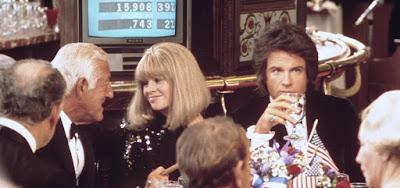Format: DVD from personal collection on laptop.

Once upon a time, there was a world were all everyone thought about was sex. Oh, sure, they might have done other stuff and worked for other stuff, but based on a lot of the movies, there was a great deal of free love happening everywhere. Surprisingly, I’m not talking about the ‘60s, but the mid-‘70s. Shampoo comes out of that period, and while there is a plot here, that plot and everything about it revolves entirely around sex. This isn’t a judgment on the film; it’s just a statement of fact.
George Roundy (Warren Beatty) is a successful hairdresser in Beverly Hills. He’s been able to use this position to meet and bed dozens upon dozens of women. What he’d really like to do is open his own salon, but he doesn’t have the funds to do it. While he is clearly the creative talent in the salon, he’s under the thumb of the salon’s owner, Norman (Jay Robinson). Of more pressing concern to him is his trio of relationships. He has a girlfriend, Jill (Goldie Hawn); he has an ex, Felicia (Lee Grant); and he has a customer with whom he frequently sleeps, Jackie (Julie Christie). This trio of relationships is made more difficult because George is actively soliciting backing money from Lester Karpf (Jack Warden), who happens to be married to Felicia and is having an affair with Jackie.
And that is almost literally the entire movie. I’m serious. George goes hopping from bed to bed like a modern-day Tom Jones with a hair dryer, and his inability to keep it in his pants leads to a variety of consequences. The genius of the film is that those consequences are initially a little awful and funny and eventually awful and worldview altering. Consider, for instance, that at one point George shows up at Felicia’s house to do her hair. He instead encounters her daughter, Lorna (Carrie Fisher!). Because George is George, he almost immediately goes to bed with Lorna. Then, when Felicia arrives home, it turns out she’s not that interested in having her hair done. So, it’s kind of awful in that moment, but also comic in the sense that George has put himself into this kind of sexual stress.
By the time we get to the end of the movie, though, George’s constant sex is destroying his relationships and the relationships of other people. Toward the end, he finally seems to come to figure out exactly what has driven him to behave the way he does. He went to beauty school initially because, well, there were women there and there would be women customers. He went specifically for the sex. And now that he’s working in the field, the sex seems to be the only thing that motivates him. He’s never really grown up beyond being a horny teenager because he’s never really had to, and while this is played for comedy through much of the film, it ends on a specifically tragic note.
I’m not, as a rule, a huge believer in Warren Beatty, and yet I can’t think of anyone from this era more perfectly suited to this role. George Roundy needs a level of animal magnetism to him; there has to be a clear sex appeal in the character. At the same time, there needs to be a level of seriousness to make the role work. Beatty could manage that. He was capable of the sort of boyish charm, caddishness, and depth that the role quixotically demands. The other leading men of that era who would have the sexual charisma—Burt Reynolds, say—couldn’t pull off the dramatic chops. The more serious actors either weren’t boyish enough (Nicholson could never work in this role) or didn’t have the raw charisma (Dustin Hoffman, say) to make everything work the way it needed to.
A great deal of the film also turns on the other performances. Lee Grant won a supporting Oscar for this film and Jack Warden was nominated for one. For me, it’s Warden who makes the film along with Goldie Hawn. As with Beatty, I’ve never been a huge believer in Hawn, but here she’s very good. She spends the film being badly wounded by George’s actions and ultimately does what everyone in the audience wants her to do by the film’s end. Julie Christie is worth a nod here as well.
I guess my problem with Shampoo is that it somehow ends up being less than the sum of its parts. I like that it moves painlessly and invisibly from comedy to drama. This happens without us knowing it will. A scene that would have clearly been comic at 30 minutes in becomes desperate and tragic at 1:20. All of that works, and yet somehow the film feels disconnected in some ways. There’s a lack of George really seeming to struggle for anything. We’re told he wants his own shop and he does attempt to get a bank loan at one point, but it never really seems like anything that matters to him that much.
Maybe that’s intentional. But intentional or not, it does make anything that feels like it should be important feel a lot less so.
Why to watch Shampoo: Starts as a comedy, ends as a revelation.
Why not to watch: It’s all about sex all the time.
